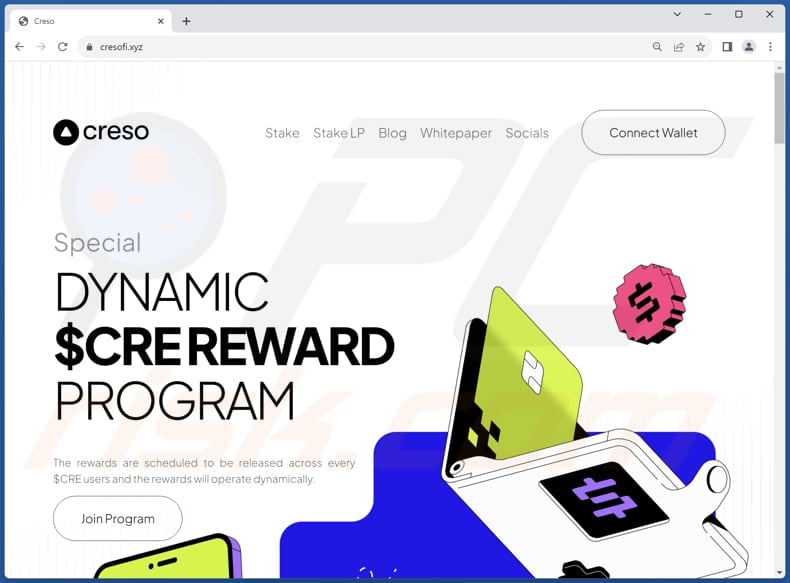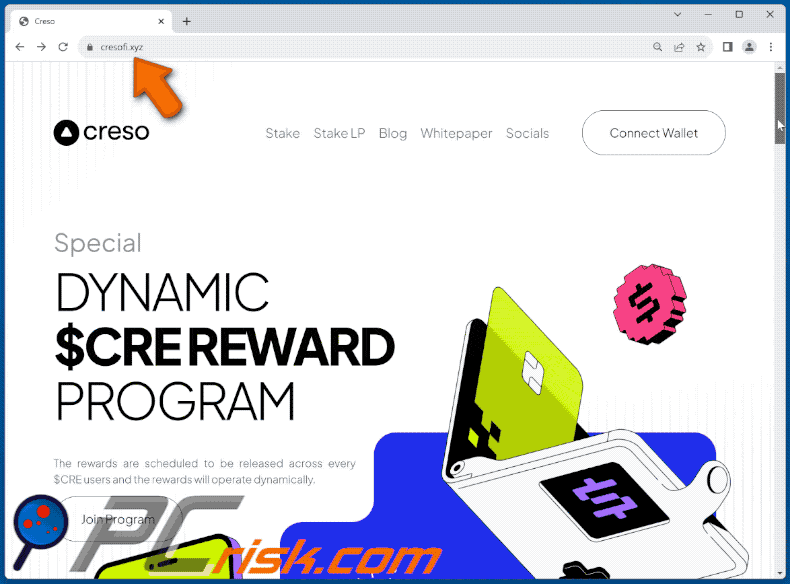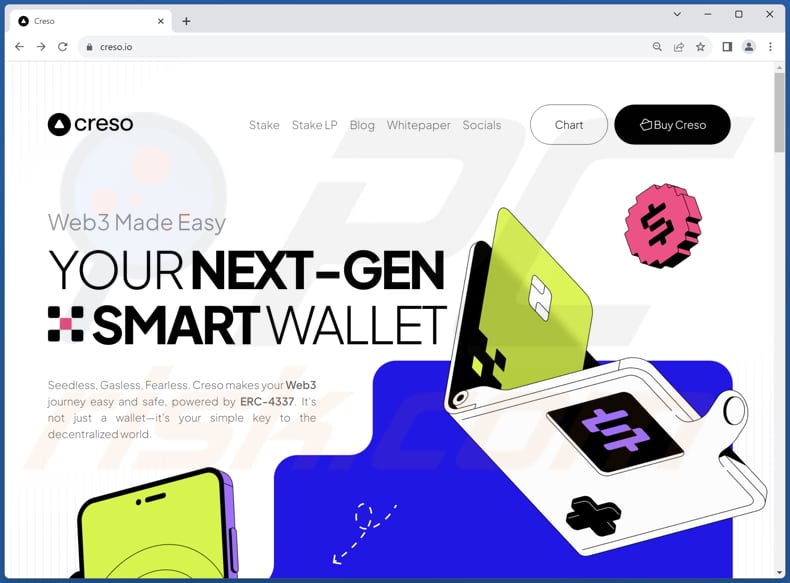Get free scan and check if your device is infected.
Remove it nowTo use full-featured product, you have to purchase a license for Combo Cleaner. Seven days free trial available. Combo Cleaner is owned and operated by RCS LT, the parent company of PCRisk.com.
What is "Creso Rewards"?
Our analysis uncovered evidence that the Creso Rewards site is operating as a fraudulent entity, presenting itself as an authentic platform (creso[.]io). This deceptive mimicry indicates that the scam is designed to exploit the credibility and reputation of the legitimate Creso platform to deceive unsuspecting users. The purpose of this scam is to steal cryptocurrency.

"Creso Rewards" scam in detail
On the Creso Rewards site (cresofi[.]xyz), users are lured by the promise of cryptocurrency rewards. The site claims that these rewards will be distributed among all $CRE users and will operate dynamically. The page encourages visitors to join the program by connecting their wallets.
However, complying with the instructions on the website, such as "connecting" a wallet, results in signing a malicious contract. This contract triggers a cryptocurrency drainer, enabling scammers to automatically siphon cryptocurrency from the victim's wallet to their own.
Considering the intricacies of cryptocurrency transactions, once a transfer is finalized and recorded on the blockchain, reversing it poses significant challenges, if not outright impossibility. Consequently, individuals victimized by such scams frequently face formidable obstacles when attempting to recover their lost funds.
Users must prioritize caution and enforce strong security protocols to minimize their vulnerability to falling victim to such scams.
| Name | Fake Creso Rewards website |
| Threat Type | Phishing, Scam, Social Engineering, Fraud |
| Fake Claim | Participants can claim rewards (cryptocurrency) |
| Disguise | Legitimate Creso platform |
| Related Domain | cresofi[.]xyz |
| Detection Names (cresofi[.]xyz) | CyRadar (Malicious), Fortinet (Spam), Seclookup (Malicious), Full List Of Detections (VirusTotal) |
| Symptoms | FMisspelled domain, lack of official verification, unrealistic claims, too good-to-be-true promises. |
| Distribution methods | Compromised social media accounts, hijacked WordPress sites, rogue online pop-up ads, phishing emails, unwanted applications. |
| Damage | Loss of sensitive private information, monetary loss, identity theft, possible malware infections. |
| Malware Removal (Windows) |
To eliminate possible malware infections, scan your computer with legitimate antivirus software. Our security researchers recommend using Combo Cleaner. Download Combo CleanerTo use full-featured product, you have to purchase a license for Combo Cleaner. 7 days free trial available. Combo Cleaner is owned and operated by RCS LT, the parent company of PCRisk.com. |
Conclusion
In conclusion, the scam involving the Creso Rewards site underscores the ongoing challenges posed by fraudulent entities in the cryptocurrency space. By masquerading as a legitimate platform, the scam preys on unsuspecting users, exploiting their trust and familiarity with reputable brands.
By exercising caution and verifying the legitimacy of platforms before engaging with them, individuals can better protect themselves from falling prey to such scams in the future. Some examples of similar scams that must be avoided are "Solana Mobile", "$BASING PRESALE", and "BITCOIN BSC Scam".
How did I open a scam website?
Fraudsters deploy a range of tactics to propagate their deceitful schemes, often seizing control of verified social media profiles. These profiles, which may belong to celebrities, public figures, or reputable businesses, serve as unsuspecting bait for users. By compromising these trusted platforms, scammers entice individuals to visit their fraudulent websites, where they fall victim to their ploys.
Moreover, users may stumble upon scam pages through misleading ads, pop-ups, notifications from untrustworthy sites, and hijacked websites, often those built on WordPress platforms. Additionally, scammers frequently create websites with domains that closely mimic those of legitimate projects to trick users.
Furthermore, individuals may inadvertently encounter scam-hosting pages while visiting pages that utilize shady advertising networks, such as torrent sites or illegal movie streaming platforms.
How to avoid visiting scam pages?
Prior to engaging in any online activities, ensure to validate website URLs to ensure alignment with official domains. Approach online advertisements, buttons, and pop-ups on questionable pages with caution. Exercise vigilance when handling unsolicited or irrelevant emails containing links, particularly if they originate from unfamiliar addresses.
Refrain from granting permission to dubious sites to display notifications and refrain from downloading software from unofficial sources such as third-party app stores, unofficial websites, or peer-to-peer (P2P) networks. Acquire applications and files exclusively from official pages and app stores.
If your computer is infected with unwanted apps, we recommend running a scan with Combo Cleaner Antivirus for Windows to automatically eliminate them.
The appearance of "Creso Rewards" scam (GIF):

Legitimate (official) Creso website (creso[.]io):

Instant automatic malware removal:
Manual threat removal might be a lengthy and complicated process that requires advanced IT skills. Combo Cleaner is a professional automatic malware removal tool that is recommended to get rid of malware. Download it by clicking the button below:
DOWNLOAD Combo CleanerBy downloading any software listed on this website you agree to our Privacy Policy and Terms of Use. To use full-featured product, you have to purchase a license for Combo Cleaner. 7 days free trial available. Combo Cleaner is owned and operated by RCS LT, the parent company of PCRisk.com.
Quick menu:
- What is Fake Creso Rewards website?
- How to identify a pop-up scam?
- How do pop-up scams work?
- How to remove fake pop-ups?
- How to prevent fake pop-ups?
- What to do if you fell for a pop-up scam?
How to identify a pop-up scam?
Pop-up windows with various fake messages are a common type of lures cybercriminals use. They collect sensitive personal data, trick Internet users into calling fake tech support numbers, subscribe to useless online services, invest in shady cryptocurrency schemes, etc.
While in the majority of cases these pop-ups don't infect users' devices with malware, they can cause direct monetary loss or could result in identity theft.
Cybercriminals strive to create their rogue pop-up windows to look trustworthy, however, scams typically have the following characteristics:
- Spelling mistakes and non-professional images - Closely inspect the information displayed in a pop-up. Spelling mistakes and unprofessional images could be a sign of a scam.
- Sense of urgency - Countdown timer with a couple of minutes on it, asking you to enter your personal information or subscribe to some online service.
- Statements that you won something - If you haven't participated in a lottery, online competition, etc., and you see a pop-up window stating that you won.
- Computer or mobile device scan - A pop-up window that scans your device and informs of detected issues - is undoubtedly a scam; webpages cannot perform such actions.
- Exclusivity - Pop-up windows stating that only you are given secret access to a financial scheme that can quickly make you rich.
Example of a pop-up scam:

How do pop-up scams work?
Cybercriminals and deceptive marketers usually use various advertising networks, search engine poisoning techniques, and shady websites to generate traffic to their pop-ups. Users land on their online lures after clicking on fake download buttons, using a torrent website, or simply clicking on an Internet search engine result.
Based on users' location and device information, they are presented with a scam pop-up. Lures presented in such pop-ups range from get-rich-quick schemes to fake virus scans.
How to remove fake pop-ups?
In most cases, pop-up scams do not infect users' devices with malware. If you encountered a scam pop-up, simply closing it should be enough. In some cases scam, pop-ups may be hard to close; in such cases - close your Internet browser and restart it.
In extremely rare cases, you might need to reset your Internet browser. For this, use our instructions explaining how to reset Internet browser settings.
How to prevent fake pop-ups?
To prevent seeing pop-up scams, you should visit only reputable websites. Torrent, Crack, free online movie streaming, YouTube video download, and other websites of similar reputation commonly redirect Internet users to pop-up scams.
To minimize the risk of encountering pop-up scams, you should keep your Internet browsers up-to-date and use reputable anti-malware application. For this purpose, we recommend Combo Cleaner Antivirus for Windows.
What to do if you fell for a pop-up scam?
This depends on the type of scam that you fell for. Most commonly, pop-up scams try to trick users into sending money, giving away personal information, or giving access to one's device.
- If you sent money to scammers: You should contact your financial institution and explain that you were scammed. If informed promptly, there's a chance to get your money back.
- If you gave away your personal information: You should change your passwords and enable two-factor authentication in all online services that you use. Visit Federal Trade Commission to report identity theft and get personalized recovery steps.
- If you let scammers connect to your device: You should scan your computer with reputable anti-malware (we recommend Combo Cleaner Antivirus for Windows) - cyber criminals could have planted trojans, keyloggers, and other malware, don't use your computer until removing possible threats.
- Help other Internet users: report Internet scams to Federal Trade Commission.
Frequently Asked Questions (FAQ)
What is a crypto scam?
A cryptocurrency scam involves deceitful tactics aimed at luring individuals into investing in cryptocurrency, disclosing personal information, or transferring funds. Consequently, victims may endure financial losses, theft of personal data, or unauthorized entry into their cryptocurrency wallets.
Is it possible to retrieve lost crypto funds?
Restoring lost cryptocurrency funds is often a challenging endeavor, and in many cases, it proves to be impossible. This challenge arises from the decentralized and anonymous characteristics inherent in cryptocurrencies.
Why do I encounter crypto scams?
Scammers employ a variety of methods to disseminate their scams. The most common ones are phishing emails, compromised social media profiles, misleading advertisements, and pop-ups on unreliable websites. They also seize control of legitimate websites, such as WordPress sites, to propagate their schemes and leverage platforms linked to rogue advertising networks, like torrent sites and illegal movie streaming pages for their deceptive agendas.
Will Combo Cleaner protect me from scams?
Combo Cleaner possesses the ability to assess websites and identify scam web pages. Upon detection, users promptly receive alerts and access restrictions are immediately implemented.
Share:

Tomas Meskauskas
Expert security researcher, professional malware analyst
I am passionate about computer security and technology. I have an experience of over 10 years working in various companies related to computer technical issue solving and Internet security. I have been working as an author and editor for pcrisk.com since 2010. Follow me on Twitter and LinkedIn to stay informed about the latest online security threats.
PCrisk security portal is brought by a company RCS LT.
Joined forces of security researchers help educate computer users about the latest online security threats. More information about the company RCS LT.
Our malware removal guides are free. However, if you want to support us you can send us a donation.
DonatePCrisk security portal is brought by a company RCS LT.
Joined forces of security researchers help educate computer users about the latest online security threats. More information about the company RCS LT.
Our malware removal guides are free. However, if you want to support us you can send us a donation.
Donate
▼ Show Discussion